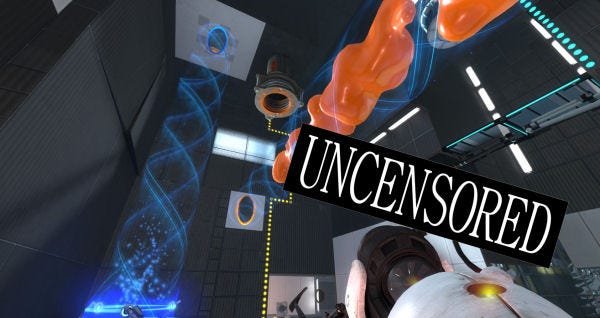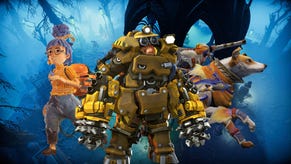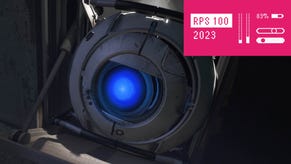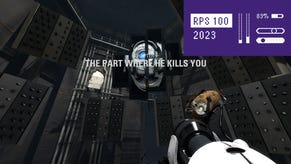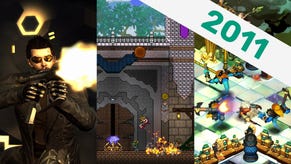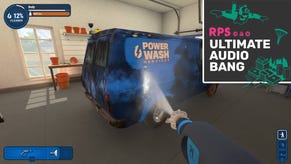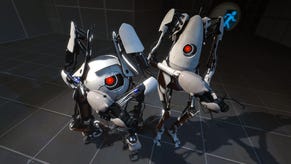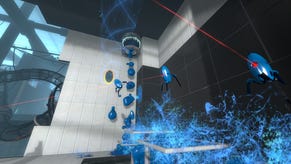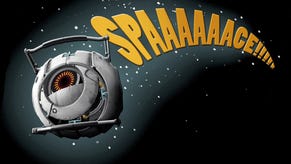Valve On Portal 2: Spoiler Interview Part One
In an exclusive interview with two of Portal 2's writers, Chet Faliszek and Jay Pinkerton, we take the opportunity to discuss the game now most people have finished it. In the first part of our spoiler-packed chat we discuss the motivations behind the sequel's content, favourite Easter eggs, and how Portal 2 almost contained no GLaDOS, no Chell, and even at one point, no portals. Have we mentioned that there's spoilers?
RPS: How do you approach a sequel after a self-contained story? How much of things like bringing GLaDOS back was by necessity?
Chet: It didn’t start that way. We always experiment, try new things, goof around. And it way off tangent, crazy, no GLaDOS, no portals.
Jay: He’s not kidding. At one point there were no portals, or GLaDOS. We try everything and we playtest everything.
Chet: That’s the way we work. The game’s been in development for a while. There’s a small core team that starts on it, and they start experimenting with ideas, see what’s interesting. The original goal was the have the sense of Portal, the feel and vibe of Portal, and what else happened was open. A lot of those experiments then get integrated into the core experience. People wanted more portals, they wanted GLaDOS, they wanted to be Chell.
RPS: Why do people want to be Chell? A character with whom you have no connection.
Chet: I don’t think they wanted to be Chell. I think they wanted to be the person who killed GLaDOS.
Jay: You don’t want to meet GLaDOS in the second game and she has no recognition of you. There is a lot of back and forth, with game design, all these new mechanics, and then they come to us and we try to fit story, and that suggests new things for the design. At one point two years ago some Cave Johnson dialogue got leaked – so I can now tell you, two years ago Cave was the bad guy in Portal 2 and GLaDOS wasn’t in the game. It was a prequel. We liked the character enough that we snuck him into this.
RPS: The Cave section is almost like a prequel. Was that the desire to keep that section in?
Jay: Originally we were almost seeing how far we could push the line, and at some point, with saner heads, we realised, you know what, we want to see GLaDOS again. We want Chell back. It was us trying to try new things, but then I think realising that we missed a lot of the elements that made the Portal 1 story.
Chet: One of the cool things about Portal has been Aperture Science itself. So there was a lot more about Aperture Science. At one point we said, “Let’s just put it in Aperture Science and worry about the rest later.” So you have the whole of, they keep trying stuff, and as it goes bad they just brick it up, move on, never talk about that again.
Jay: Having said that, Portal 2 is two and a half times longer than Portal 1 – we couldn’t just have the same test chambers. It would have gotten fairly dull. So it was a lot of fun for us to create new characters. “Let’s explore this for a while… I think it’s about time GLaDOS came back – let’s see what she’s been up to.” Juggling those balls gave us more of a sense of momentum than it would have been if it was just GLaDOS hectoring you for eight hours.
Chet: We don’t have this big design document that we write out before we start a project, that we must adhere to at… all… costs… and… nothing… must… change. We do have things we do before running off. There’s goals, we’re not totally insane. But at the same time we’re not stuck to a plan. We’re way more flexible.
Jay: Other stuff snowballs. We came back and said, “Well, Wheatley’s going to be a villain now, and he’s also an idiot, so what would Aperture look like now it’s run by an idiot?” The level designers just had a blast. That snowballed, and we were bouncing back and forth. Certain things catch and they become these huge things. Similarly for us, our wishlist was Stephen Merchant, J.K. Simmons. And suddenly we heard back that they would do it, and those roles got more ambitious.
RPS: The original Portal was very funny, but felt like a puzzle game that was funny. Portal 2 feels much more like a comedy game. It seems to be a more important focus.
Chet: I think in the first one all that snuck up on you. That uneasy beginning, and then, “Oh, I can laugh.” How we start this one, we say, “It’s okay to laugh.” With comedy you kind of have to tell people sometimes that it’s okay to laugh. “You’re going to be laughing, you’re going to sit back and enjoy.” If you’re not laughing in the first ten minutes because of Stephen Merchant, you’re dead.
Jay: One telling thing, people often forget how minimalist the first game is. When they think about it, they tend to think about the break-out scene at the end. You don’t want to take people back to square one. You want to think where to go next from there.
RPS: There’s three writers, right? You guys and Erik Wolpaw. So which of you is it that has the horrible mother?
Jay: It was less mother issues than it was – and this is something that Erik was very adamant about – it was doing things you hadn’t seen before. There are so few strong female villains, that it was fun for us to write in a way that writing the stock Jeremy Irons villain wouldn’t have been. I think that’s true of a lot of the characters. We try to give them enough of a character that it’s not just shtick. They can get genuinely tender, they can get genuinely villainous. When Wheatley does his heel-turn at the end he drops the comedy pretence entirely – he’s just mad at you. And at the end of the credits sequence he’s genuinely sorry. It’s finding comedy in those moments, where it’s not just this one note. I think GLaDOS exemplifies that, where she’s not just this moustache-twirling villain.
RPS: But there’s also this maternal cruelty about her.
Jay: The passive-aggressive nature of her is definitely the through-line. She’s never going to overtly attack, it’s always these subtle mind games. Which again was super-fun for us when Wheatley was in charge, and trying the same thing. He’s ham-fisted in his approach, “Fatty-fatty-fat-fat.”
RPS: You give GLaDOS a bunch more motivation, too. Was a part of it looking at the first game and asking “Why? Why is GLaDOS evil? What motivates her?”
Chet: “What does she eat in the morning?”
Jay: I think a lot of it was the wishlist of: what do we want to do this time around? One thing I wanted to try was: wouldn’t it be neat to have you and GLaDOS as buddy cops against a new threat? It wasn’t until we started executing it that I realised that half of this buddy-cop team doesn’t talk, so that doesn’t work too well. So that required some last-minute rejigging. So it was this laundry list, we loved these characters, we’d lived with them for two years, so what would happen if we did this? What would happen if we did that?
RPS: What would happen if we put her in a potato?
Jay: Exactly. We’ve seen what happens when she’s imperious and in power. What happens when we strip away that power. A lot of that was a game of Jenga. You’re taking stuff off the bottom and seeing what happens.
RPS: The idea that when Wheatley goes into the machine he becomes evil too – it seems it’s an inevitability of being so powerful. Power corrupts?
Jay: Yeah, power corrupts absolutely, and if you’re an absolute moron it happens five times as fast. The other thing was, GLaDOS was able to handle it. I think it’s left vague whether she was ever under its control.
RPS: But as a potato, she does seem to be a nicer person. But that’s influenced by the discovery of her being Caroline.
Jay: When we playtested, we found a very stark difference between this imperious, all-powerful GLaDOS talking to you, and this powerless GLaDOS talking to you on your gun. And what we discovered was, point blank, no one wants to hear this woman telling you you’re an awful person, dumb and fat, while she’s sitting on your gun. People were asking, “Why am I carting this person along?” By a matter of necessity GLaDOS needed to have a character shift. She’s going to be your sidekick – she can’t just be needling you for a half hour.
Chet: Also, she’s a potato.
RPS: You’re motivated to keep her around, because you release she’s your only hope.
Jay: Something else Erik noted was there’s a difference between the player and Chell. When the player first stumbled on GLaDOS in early tests, the idea was that you as the player would turn her on. But no one wanted to. We were curious, because everyone wanted GLaDOS back. And we realised, yes they want her back, but as embodying the player they thought, “Why would I want this killer to turn back on again?” So there’s that same carried on – people wondering, why would I want this potato with me when she’s clearly this bad person who’s eventually going to betray me? Playtesting really helped us get that right.
[At this point Chet notices an odd, futuristic-looking Motorola device on the table we’re sat at.]
Chet: There’s a lot of Motorola gear here.
RPS: Were they in recently?
Chet: I’m pretty sure this is my gift. Gabe just left it here for me… I probably shouldn’t steal it.
Jay: You probably shouldn’t steal it on tape.
Chet: Can you just turn the tape recorder off for a minute because I’m clearly not going to steal the gear someone left here…
...Alright! Now we’re back, and the table’s fresh and clean.
RPS: So, there’s this turret on a conveyer belt, which I rescued.
Jay: Yeah, that’s an Easter egg. Not everyone picks that turret up.
RPS: She told me about Caroline. How did she know about that?
Jay: What’s the official name for the turret?
Chet: It’s the Oracle Turret.
Jay: Which tells you everything you need to know. My favourite Easter egg, which people can go find, is in the final act. Evil Wheatley has you on a conveyer belt which you can jump out of, with a spinny blade wall. You can jump out of that thing again and again, and he starts begging you to get back in, before restarting his super-villain speech. It’s always tickled me.
RPS: I loved the dismissive treatment of the Weighted Companion Cube. Obviously there was so much lunacy about a box with a heart on it – did that take Valve by surprise?
Chet: Yeah, if we would have known we would have had more cubes to sell.
Jay: One thing we all agreed on this time around was, once something becomes a meme it belongs to the world and not us any more. No cake, no companion cube. We could hear people’s eyes rolling if we went back to the cake.
Chet: But clearly if you haven’t finished the game yet, everyone else can talk about cool stuff and you’re out of it, so you’d better buy it.
RPS: I like the allusions toward cake, and GLaDOS’s cold dismissal of the Weighted Companion Cube might be the cruelest moment in the game.
Jay: But you do get your Weighted Companion Cube back at the end. And we can guarantee that’s the exact same one. It’s the Portal 1 companion cube.
RPS: Well, I am the person who painted one on my freezer.
Jay: I just put meat in mine.
Join us for the second and final part of the interview later this week.
